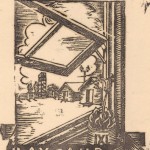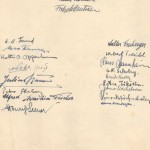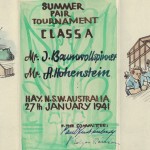Cultural background: English
Place of origin: Manchester, UK
Date of arrival: 1940s
Migrant accommodation: Hay
I am attaching my father’s Bridge Club competition certificate and a Leaving Card signed by fellow inmates of Hay Camp. I believed that they were both designed and produced by one the Camp artist’s Ludwig Hirshfeld Mack. My father nee Gotthard Baumwollspinner was from a German Jewish family, born in Cottbus, ( about equidistant between Dresden and Berlin) Germany in 1918 and his parents owned a wine and spirits business as well as owning property in Dresden.
Both his birthplace and the business premises are still standing in the town. My father arrived in U.K in 1935 to study at secondary school in Brighton, and went on to Manchester University where he graduated in 1939 with a degree in structural engineering. In 1940 he was detained as an enemy alien, in spite of his Jewish heritage, and shipped on the Dunera to Australia and held at Hay Camp.
On his release from Hay Camp, he returned to the U.K where he met my mother Pauline Mann and they were married in 1943.
During 1942-43 he volunteered and trained with 3 Troop, 10 Commando, (aka X Troop), largely comprised of Jewish refugees; they were to provide invaluable service as front-line interrogators and intelligence operatives attached to other commando units and as clandestine raiders behind enemy lines (1). (Quentin Tarantino’s film Inglorious Bastards may have been inspired by the activities of the Troop).
In 1944 during fighting in Italy near the River Garligliano, my father was severely wounded, and saw no further service, until he was involved in interrogating prisoners of war after the fall of Berlin.
At the end of the war, my father became a naturalised British subject and changed his name to Barnes, since there were plenty in the London phone book and the name had echoes of his original name
My father had two brothers and one sister; Freddie deceased, and Max who now lives in Denmark, having escaped from Germany to Sweden in the early years of the war. His sister, Erna Bieler, was in Poland at the beginning of the war, and travelled usually on foot through Europe to Spain where she was interned, and thereafter a succession of internment camps in Portugal, North Africa, Jamaica, and Cuba. In Cuba she met a visiting couple form the U.S who secured her an entry visa into the States, where she worked in New York for Bloomingdales, and is now 96.
My father died in 1984.




